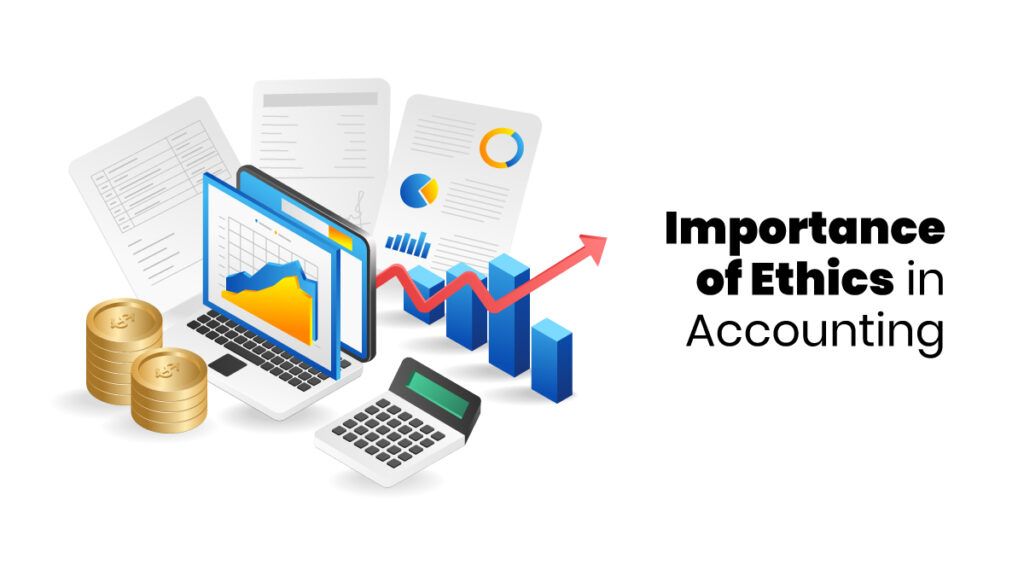Accounting is necessary for businesses because it helps track and understand financial information to make good decisions. However, the trustworthiness of this financial information depends a lot on how honest accountants are. Ethics, which means doing the right thing, is essential in accounting. It’s a big deal for the success of any business. This blog will discuss the importance of ethics in accounting.
Ensuring Public Trust
An essential job for accountants is to give the public correct and trustworthy financial information. People and investors depend on this information to decide whether to invest in companies. If accountants don’t follow ethical rules, it can harm the public’s trust in accountants and spoil the profession’s reputation.
Following Laws
Accountants must follow all the laws and rules when creating financial statements. If they don’t, they could face legal action. Sticking to ethical rules helps accountants ensure they follow all the legal and regulatory requirements.
Being Professional
Adhering to ethical rules is a big part of being professional in accounting. Being professional is crucial for creating and maintaining trust in accountants and clients’ relationships. Acting ethically shows a commitment to the profession and a willingness to do what’s best for clients.
Managing Risks
Acting unethically in accounting can bring significant risks for the accountant and their firm. Giving wrong financial information can result in legal trouble, harm their reputation, and cause economic loss for clients and stakeholders. Following ethical principles helps accountants reduce these risks and safeguard their clients and stakeholders.
Applying Ethical Principles in Practice
Applying Ethical Principles in Practice is a fundamental aspect of the accounting profession, assuring the integrity and reliability of financial information. This commitment to ethical standards involves various principles guiding accountants in their conduct and decision-making.
Integrity
Integrity is a cornerstone principle requiring accountants to act honestly and objectively. They must avoid conflicts of interest and transparently disclose them when present. Establishing trust and credibility in financial dealings is crucial to prioritising clients’ best interests.
Objectivity
Objectivity requires accountants to maintain impartiality and unbiased professional judgments. Personal interests or relationships must not sway decisions, ensuring that financial reporting remains fair and free from undue influence. This principle safeguards the profession’s integrity, fostering trust in economic assessments.
Confidentiality
Confidentiality is vital because accountants have access to sensitive financial information. They are entrusted with keeping this data confidential, refraining from sharing it with unauthorised parties or using it for personal gain. This dedication to privacy establishes a solid foundation of trust between accountants and their clients.

Maintaining Professional Competence
Professional competence management involves ongoing education and training for accountants. It requires staying informed about industry advancements to provide services aligned with their qualifications. Any misrepresentation of qualifications or experience is strictly forbidden, upholding the high standards of professionalism within the field.
Following these ethical principles acts as a compass for accountants, directing them professionally. Upholding these principles guarantees the precision and dependability of financial information, fostering a robust basis of trust between accountants and their clients. This commitment strengthens the integrity of the accounting profession, playing a crucial role in promoting transparency and ethical conduct across the financial landscape.
Dive into the forefront of accounting expertise by enrolling in Finprov’s esteemed accounting training programs. We offer a variety of online job-oriented courses, including CBAT, PGBAT, Income Tax, Practical Accounting Training, PGDIFA, DIA, GST, SAP FICO, Tally Prime, and MS Excel. These courses are thoughtfully crafted to cater to the diverse needs of learners at different career stages.
The future of accounting looks promising with advancements in technology and a growing emphasis on ethical practices. Our 6-month accounting courses online prioritize practical training, equipping you with skills directly applicable to real-world scenarios. At Finprov, we are dedicated to providing education that goes beyond traditional boundaries, ensuring your success. Our accounting training and placement assistance open doors to lucrative opportunities in India, offering a clear path to enhance your skills for a more promising and prosperous future.










